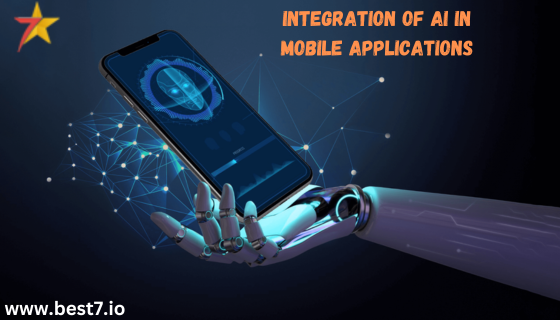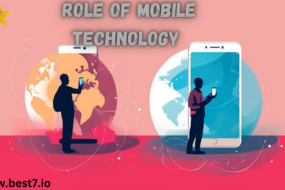
Artificial intelligence, in the current trends of mobile technology, has been significantly impacting mobile applications. The AI technology continues to advance into a smarter solution for developers to create an interactive platform for their apps.
AI’s Growing Influence Across Industries
AI technology has become more and more prevalent in a substantial number of sectors, including health care, finances, and entertainment. According to Tomas Watson, the AI global market in mobile applications will grow to 126 billion USD in 2025. The increasing importance of AI includes an increase in the functionality of a mobile app. The developers are gradually launching AI-based applications to provide unique user experiences for up-to-date user’s needs.
Enhancing User Experience Through AI
One of the most important benefits of introducing AI impacts is the user experience. The technology allows application systems to learn from the users’ actions and provide a personal user experience. AI provides a solution for a more quickly adapted app toward the users’ daily routines. AI algorithms analyze the users’ data and develop suggestions for content, products, and services. According to McKinsey, companies that personalize their website and application increased their sales rate up to 10%-15%.
Reshaping Personalization with Machine Learning
The use of machine learning in mobile applications has modified the way personalization is carried out. By analyzing data, the work of algorithms becomes more predictable, helping machines anticipate user needs. For instance, Spotify’s use of machine learning helps create personalized playlists based on what users typically listen to on the app. Currently, more than 30% of users actively listening to Spotify have found new music from the app’s personalized playlists, proving that AI use enhances user experience.
The Rise of Smart Mobile Technology
The introduction of smart mobile technology has also been facilitated by the increased use of AI. Voice assistants like Siri, Google Assistant, and Alexa can understand speech better now because of this addition. The implementation of voice commands to execute tasks like setting reminders, sending messages, and controlling smart home devices improves overall satisfaction as these gadgets can be used to make tasks easier. According to Pew Research, 55% of people using smartphones have used a voice assistant, which goes on to show the gadget feature’s acceptance.
Meeting Future Expectations with AI
It is clear from the above applications that the use of AI in mobile depends greatly on how it will shape its future. Over time, users develop a habit of top-tier features and seamlessly adapt to their use. They expect this to be the same with mobile applications; therefore, they will progressively want to see better AI use in apps. Mobile application designers will now be required to create products that surpass current user expectations and predict future evolutions. According to Deloitte, approximately 71% of consumers think that brands should understand their personal preferences.
Boosting User Engagement in Mobile Apps
The integration of AI in mobile apps helps enhance user engagement. AI algorithms help analyze how users interact with apps, and they provide real-time feedback to developers. With AI, developers can know how to tweak their apps for optimum functionality. For example, AI used in mobile gaming apps helps adjust difficulty levels based on a player’s level. In so doing, developers can ensure users are engaged throughout the gaming process. According to research by Newzoo, the global mobile games market will top $100 billion by 2023 and is partly attributed to the advancements in AI technologies.
AI-Powered Customer Service
Moreover, AI helps when it comes to customer service as the primary feature in mobile applications. Over time, AI-powered chatbots have increasingly become the go-to solutions for most mobile applications to provide instant help to users. AI chatbots can handle all inquiries, be it simple questions or complex issues. A Juniper Research report shows that chatbots will be responsible for over 90% of customer interactions. This is a great advantage to businesses as customer care can be labor-intensive.
AI’s Role in Predictive Analytics
AI used in mobile apps and even other technology helps develop apps that assure optimum user experience through personalization. AI algorithms can be used to analyze a huge amount of data. Therefore, it is now possible for developers to utilize predictive analytics in their applications to predict user needs. The result is tailored in-app content and features. Gartner conducted a study and found that companies that used predictive analytics strategies in their apps achieved a projected 25% increase in their user retention.
AI Integration in Advertising
Another critical aspect, in which AI improved mobile technology, is in mobile ad effectiveness. Using AI algorithms to analyze user habits and preferences enables advertisers to show ads tailored specifically for them. Not only does it increase the engagement of such ads, but it also improves conversion rates. According to an eMarketer research, such mobile ads had a 25% higher click-through rate when compared to traditional ads.
AI in Education and Healthcare
Another benefit for education is the ability to gradually integrate AI into mobile education. It is now possible to create a mobile application for learning, and the program analyzes activity and gradually changes the set of learning materials. The Journal of Educational Technology & Society published a study showing that adaptive learning technologies improve learning outcomes by 25%.
AI technology is used in mobile healthcare applications. Graphs and statistical indicators reflecting the structure of nutrition and physiology are created using analytics. Based on these data, the program performs calculations and provides the user with relevant recommendations.
Advancing User Interfaces with AI
AI technologies allow mobile app developers to create more natural and user-friendly applications. With the development of various AI algorithms and innovations, developers will be able to create interfaces that adjust to specific users. According to Adobe, 77% of consumers prefer brands that provide such personalized experiences.
The Future of AI in Mobile Technology
In this way, the implementation of AI technologies in mobile apps will enable a substantial change in the interaction between technology and users. By adopting new technological opportunities, improving applications, users’ experiences, and the content offered to them, AI technologies shifted the mobile orientation significantly. With further developments, developers will be able to introduce more innovative solutions that could revolutionize the sphere.












